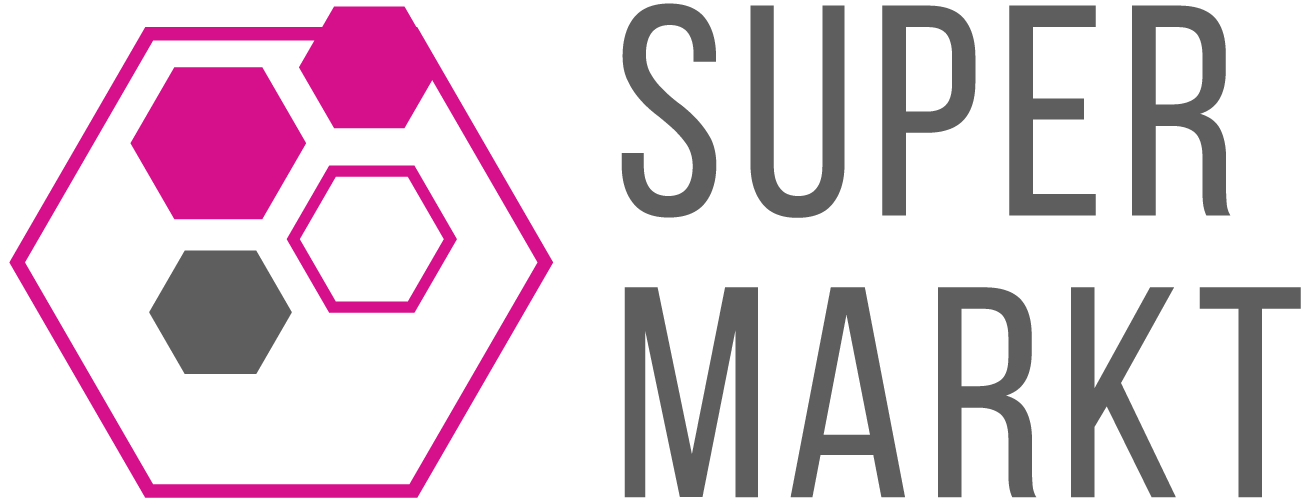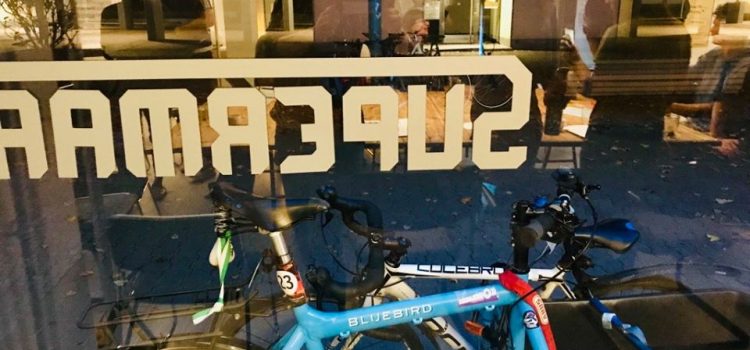This is a brief report of an event we held on October 24th, 2019 at SUPERMARKT: Building a Local Food Delivery Network. This event was collectively organized by Ela Kagel, Andreas Arnold, Thomas Dönnebrink, Jonas Pentzien, Dominik Piétron and Stefano Lombardo.
After Deliveroo pulled out of Germany in August this year, a group of delivery riders immediately started to run their own local pop-up service. They literally lost their job in the morning and started their self-employed work on the afternoon of the same day. They called themselves Kolyma2 and were on the forefront of an emergent movement of food delivery riders who work towards building their own organizations, instead of freelancing for market monopolists.
„At Deliveroo’s German operation, fewer than 10% of the 1,200 workers were on staff. The rest were people who got paid 5-6 euros per delivery.“ reports Stefan Nicola in his interesting Bloomberg article on how deliveroo riders and lime juicers threaten the German labor model. The moment when Deliveroo gave up on the German market also marked the point in time when there was nothing left to loose for freelance riders: instead of being paid hourly wages and working on a contract, as in the early days of the food delivery industry, the overwhelming majority of riders worked on the typical Gig Economy-terms: They supplied their own bikes and mobile phones and did not have any unemployment or health insurance. Given all these circumstances, the question is whether the recent stumbles of Deliveroo are clearing the path for worker-owned digital platforms to replace them?
This is what we tried to figure out in our meeting last week. Almost two months after Deliveroo’s shutdown in Germany, there are now various teams of riders in Berlin that strive at creating a local, cooperative and fair alternative to what the likes of Lieferheld etc. have to offer.
This gathering at SUPERMARKT felt special, because this was not your typical startup-pitch situation, but rather a collective effort by delivery riders, researchers, collaborative economy activists & representatives of the city administration. The overall question is: what does it take to create local, fair and cooperative delivery services that we can all benefit from? The riders, the customers, the restaurants, but also our crowded streets and natural surroundings? This touches down on the very question of how we envision our world in the near future. Do we want surveillance capitalism involved in each & every digital transaction? Do we want our food to be delivered by precariously paid workers? Are we ok with our data being exploited and used by algorithms beyond our control? Maybe we can do better than that.
During yesterday’s meeting we discussed various aspects of the food delivery market. Andreas Arnold shared some significant findings about how this market actually works:

It is probably not clear for everyone against whom self-owned rider collectives are actually competing. In fact, the public market investor BlackRock is behind most of the delivery services we know (see Andreas‘ sketch above). BlackRock is the world’s largest asset manager and has therefore unlimited access to funds and resources. So, let’s not talk about competition, let’s rather talk about niche markets outside of the realm of BlackRock. One of yesterday’s breakout groups started to work on this direction and tried to assess a strategy to address an audience of conscious customers. These are the notes of Thomas Dönnebrink, written on behalf of the „marketing“ group:
THE MARKET
Early adopters = Conscious consumers & People who like us because of …
- social goals – non exploitative, fair pay etc.
- ecological goals – (reusable (standard) packaging container or biodegradable / thoughtful packaging, local produce etc.)
- health goals – fresh healthy food
- systemic goals – supporting a different way of doing business/economy (value, trust based economy), delivery people/driver and maybe customer are / can be co-owner
Premium delivery – Added values:
- climate neutral delivery
- more local / more healthy fooed better packaging
- customer feedback / different criteria (Bio / local food )
- short delivery time and ‘fresher/warmer food’ (Max. Range per restaurant (local delivery – up to 3 km?)
- curated restaurant list, focusing on most liked / best value for your money restaurants (cherry picking)
- motivated drivers
Further questions / tasks / ideas:
- how are Stadtsalat delivery from HH (they have 2000 deliveries/day in HH) doing in Berlin. (They also produce the salad)
- breaking down Berlin in areas (replicating instead of scaling)
- flexible/dynamic pricing – if so be transparent
- call-in, recommend restaurants in the vicinity
- local delivery with local drivers (to reduce driving)
- business to business (maybe with monthly fee. Helps standardise procedures)
- different payment structure. a) cash (Many restaurants prefer to get paid cash and avoid credit cards, maybe also certain customers) b)
- crypto payments allow for automated and transparent payments and automated accounting.
- look for open source solutions for order and delivery. Share It solution with other delivery collectives (see SuperCoop in Berlin, getting their IT from SuperCoop in Paris)
- core values and code of conduct (respectful relationships vs. exploitative ones)
Another group, which was facilitated by Dominik Piétron, researcher at the Humboldt University, worked around the legal forms and organizational models. These are the group’s results in a nutshell:
FORMAL STEPS TO START A NEW UG-BUSINESS:
- decide on a statute
- notary approves it
- register at Handelskammer
- Gewerbeamt online
- register at Finanzamt
Open Question: Statute
- collect/evaluate existing blueprints
- option 1: choose blueprint and add additional document „code of conduct“
- option 2: write an own statute (might be more costly to get approved)
- content
- clarify governance principles (who are we – principle „equal pay for anybody“, business model etc.)
- clarify roles (CEO – how to limit his power?, how new people get in and out, shares can’t be sold to anybody else etc.)
collective decision making process - let it checked by experts
To Do:
- establish a Communication-Infrastructure for the „legal identity“-working group: mailing list
- have a conference call with a legal expert within the next week.
Another grop discussed open source tools for collaboration. The following text documents the collective efforts of that group:
„EOTL is developing open source tools to empower groups and individuals to collaborate sustainably. When analyzing the various courier collectives and how they operate, each has different needs and concerns- cramming everyone under the same roof of one software configuration feels wrong. Some groups want to do payment on PayPal while another accepts Bitcoin and cash only. Some riders deliver to multiple zones like Kreuzberg and Friedrichshain, while others deliver to only one zone. Who manages dispatching of orders if it’s not 100% automated?
In all cases the right amount of „elasticity of scalability“ is needed to have enough riders to meet the timely demands of customers, or conversely
enough orders to pay riders livable wages. This scalability seems like the largest challenge for all food courier collectives.
Looking at existing software solutions like Co-Op Cycle where the app developers created a traditional monolithic web app that puts everything
under the same „virutal roof“ makes for nice unified brand experience and it eases development, however, it does not offer much configurability to account for multiple collectives different needs. While peer-2-peer solutions offer greater freedom and configurability, they are often significantly more complicated to develop.
With foodforcoins.org we developed a simple web application for ordering and part of dispatching. We also have a Telegram bot that helps with dispatching the riders. We are currently discussing setting up clones of our software for the other courier collectives- Kolyma 2 and FoodFair/ies. While this would not solve the elasticity of scalability issue, it would allow for different groups to experiment as they need to without affecting others. To address the elastic scalability issue, we are exploring how to best create a large order que or API that all the collectives can feed their live order data into and allow a „matchmaking“ to take place that allow collectives to help other collective load balance when needed, while also keep the autonomy of that given collective desires. If developed right, this sort of matchmaking could allow all sorts of different types of collectives to
collaborate with one another and balance work needs.“
Yesterday’s evening was the kick-off for an ongoing series of meetups that will help bootstrapping these new organizations. The next meetup will take place on Nov 4th, at Fairmondo’s cooperative coworking space in Berlin-Kreuzberg. Watch out for further announcements & see you there!












